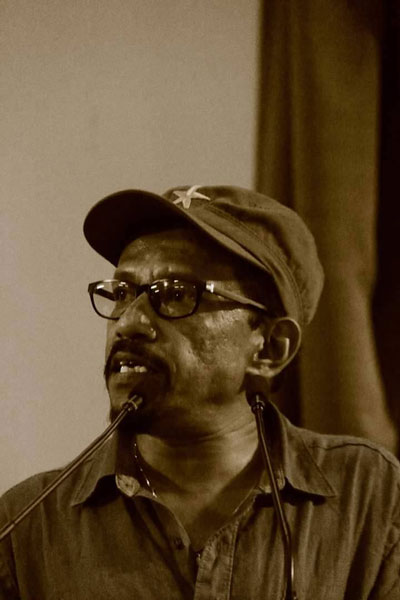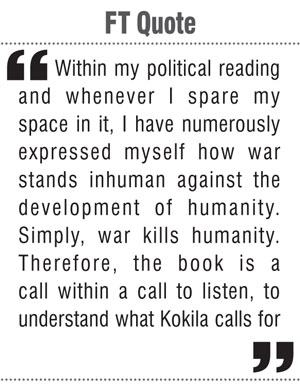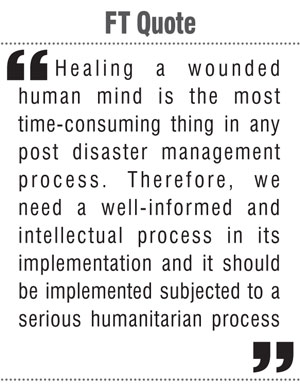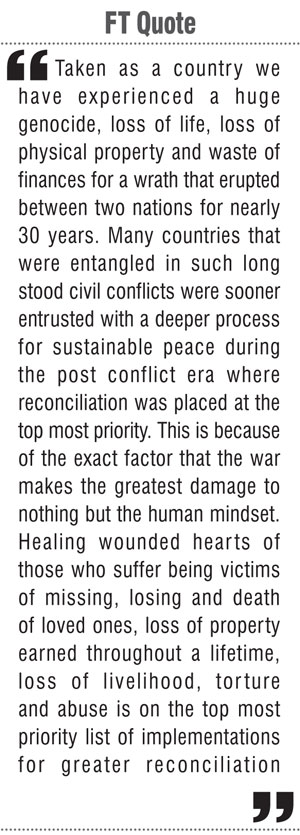Sunday Feb 22, 2026
Sunday Feb 22, 2026
Saturday, 25 June 2016 00:00 - - {{hitsCtrl.values.hits}}

Kapila M. Gamage
By Harsha Udayakantha Peiris
 ‘Theriyum Kokila,’ a book of poetry written by Kapila M. Gamage in the Sinhala language on human experiences in civil society in war-torn northern peninsula during the post-war era, is a call towards reconciliation. The book was launched recently at the Mahaweli Centre in Colombo.
‘Theriyum Kokila,’ a book of poetry written by Kapila M. Gamage in the Sinhala language on human experiences in civil society in war-torn northern peninsula during the post-war era, is a call towards reconciliation. The book was launched recently at the Mahaweli Centre in Colombo.
“Within my political reading and whenever I spare my space in it, I have numerously expressed myself how war stands inhuman against the development of humanity. Simply, war kills humanity. Therefore, the book is a call within a call to listen, to understand what Kokila calls for,” Gamage says.
Gamage is a veteran radio and television journalist who immensely contributed and performed towards the wellbeing of the agro communities through Mahaweli Community Radio (MCR) broadcasting since its inception in early 1980s. Later, following years of service as a radio and television mass media practitioner at Sri Lanka Broadcasting Corporation (SLBC) and Sri Lanka Rupavahini Corporation (SLRC), he also served as a trainer and lecturer at few higher educational institutes and universities. Being a writer of creative literature Gamage also serves as a creative script writer at present.
As he vividly expresses through poetic experiences in his publication ‘Theriyum Kokila,’ Gamage has a wider approach on an artist’s responsibility towards a sustainable national reconciliation process.
“The capacity of work that can be performed by the artist in any civil society cannot be considered minimal because prose, poetry, painting, sculpture, cinema, drama or photography can be effectively utilised in  creating space for human and mutual understanding between each other. It develops a strong platform for a realistic debate or discussion between nations and ethnicities enabling to understand their cultural life. Art is also a gateway towards inter-cultural education. Therefore, the art of poetry is a success expression in creating dialogue towards implementation of a process for national reconciliation. Intellectual intervention of the poet is a very much essential factor in this regard. A creative writer must carefully invest his or her penmanship to help effectively and sustainably establish a national reconciliation process.
creating space for human and mutual understanding between each other. It develops a strong platform for a realistic debate or discussion between nations and ethnicities enabling to understand their cultural life. Art is also a gateway towards inter-cultural education. Therefore, the art of poetry is a success expression in creating dialogue towards implementation of a process for national reconciliation. Intellectual intervention of the poet is a very much essential factor in this regard. A creative writer must carefully invest his or her penmanship to help effectively and sustainably establish a national reconciliation process.
“Taken as a country we have experienced a huge genocide, loss of life, loss of physical property and waste of finances for a wrath that erupted between two nations for nearly 30 years. Many countries that were entangled in such long stood civil conflicts were sooner entrusted with a deeper process for sustainable peace during the post conflict era where reconciliation was placed at the top most priority. This is because of the exact factor that the war makes the greatest damage to nothing but the human mindset. Healing wounded hearts of those who suffer being victims of missing, losing and death of loved ones, loss of property earned throughout a lifetime, loss of livelihood, torture and abuse is on the top most priority list of implementations for greater reconciliation.
“Within our experience, we hardly observed or monitored if it actually happened. Only physical constructions were re-erected. However, in the global context, we have observed a wider reconciliation process in action in the first place in countries where such internal insurgencies prevailed. They implemented building other physical constructions secondly but parallel to such reconciliation process towards relocating and re-establishing a strong mutual understanding between dispersed communities.

This is because, healing a wounded human mind is the most time consuming thing in any post disaster management process. Therefore, we need a well informed and intellectual process in its implementation and it should be implemented subjected to a serious humanitarian process,” Gamage says.
Gamage is also of the notion that we must adhere to the study of best practices of reconciliation implementations by other countries  for sustainable development.
for sustainable development.
“The Truth and Reconciliation Commission (TRC) implemented in South Africa is one of the best examples in this context. Through such programmes, artists can divert their pieces of creative writing towards the exact direction to heal wounded hearts and souls of thousands of victims in post conflict areas. However, here, in our experience, what happened was the exact opposite. The artists of south raised penmanship calling a greater victory that was apparently and partially biased. An exaggerative reiteration of history was practiced. Again, the other side of the same coin was forgotten. The end result was so apparent that to date we have failed to witness successful process towards sustainable reconciliation programme in action.
“The distance between the two ethnicities has widened, letting us understand the grim reality of a situation between victory and loss. This is not a win-win situation. What remains here for the loser is pain, agony, anger and hatred. That is what the loser feels on any ground regardless on which political platform he stands. This is the feeling of loss and isolation. Therefore, healing of such hearts is on the top most priority in the list of post conflict implementations in any community. On the other hand such a process should be timely initiated on sustainable grounds. So, we are in need of a better programme where there exists an assurance to prevent the formation of another separatist leader. For this, sustainably identified resolutions should be brought out and effectively addressed in the areas of socio-economic and political issues that fuelled the formation of such separatism.
“The state should not therefore, interfere or involve in between the artist and his contribution towards a ‘heartfelt’ reconciliation process. But the state has a responsibility to encourage creative writers and to implement a strategic plan or programme to exchange such creative literature in an inter-cultural context. Structural changes required for such implementations should be enacted. The whole process, as a combination of each segment, should be collaboratively parallel to each other,” he says.
Education is said to be from womb to tomb. However, rightly educating the younger generation via primary and secondary school education is a timely requirement for a sustainable reconciliation process in future where citizens regardless their race, creed, caste or religion should be empowered for the worthy cause of national socio-economic development. Gamage, in his perspective, has a visionary clarification to the fact why the study of national reconciliation should be implemented through creative writers of literature in the State education system.
“The art in any form is a sensitive process of human creativity. The artist or the writer of creative literature has a strength and power to change the mindset of a people in a smoother way that could not be changed on the other hand by threat or mere punishment. Therefore, the school curriculum should have lessons of inter-ethnic understanding included in its context. At the same time its extracurricular activities should include activities where the student actively participate to further study and research into inter cultural studies. This could be easily realised via the involvement of practitioners of creative literature.
“We all as citizens are direct and in direct victims of a war of 30 years. We paid for it from our wallet as no one invested himself in such armed conflict that offers nothing but destruction at the end. We have no more strength by now to call for another conflict and there exists no need to transfer such bitter experiences to our children’s generation because at this age, we have already become a generation that wasted the best times of our lives for a war never asked by the common people like us. Therefore, a future for each and every citizen, to peacefully involve in their day-to-day chorus and to win their rightful humanitarian needs should be created and sustainably established. We are working on such grounds with understanding of a citizen’s social responsibility towards mankind. I am only a sapling but if we can collaboratively involve as a strength, I am sure we can make a change in the thinking pattern of our social mindset towards some positive development that will drive a force of human capital for the socio-economic development of this country,” Gamage comments.
As the final remarks on the message he wants to convey to the readership through his latest publication of poetry ‘Theriyum Kokila’ Gamage has this to say: “A wider socio-political and economic change has not yet exercised after a serious armed struggle of 30 years. The war victims might be experiencing some sort of relaxation. However and so far, they have not yet received a political solution or an overall socio-independence to go on. We in the south try to see them through the same old glasses. The least situation that happens in the north is exaggerated elsewhere and sometimes how certain media publishes them is pathetic. The situation is tense in social and new media networks. This raises a greater question if we are actually made ready to embrace the people from the north as our own brothers and sisters. That is why I always emphasise a serious and sustainable national reconciliation programme is a timely requirement and an urgent call for implementation to realise the long term developmental targets of a country like ours.”
The book ‘Theriyum Kokila’ by Kapila M.Gamage is in the process of being translated into English and Tamil for wider exposure of its readership.